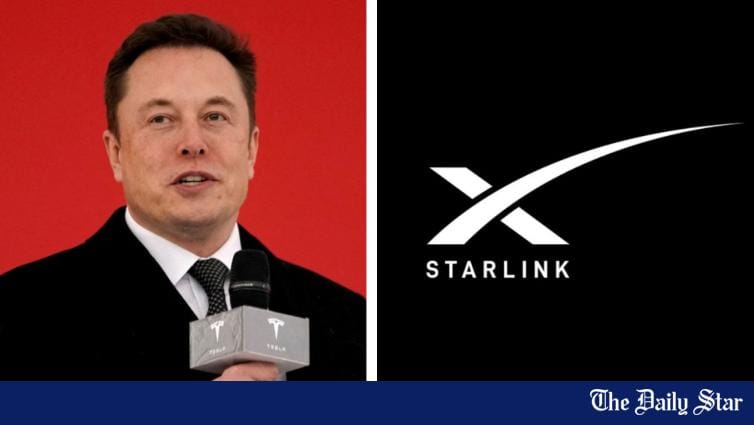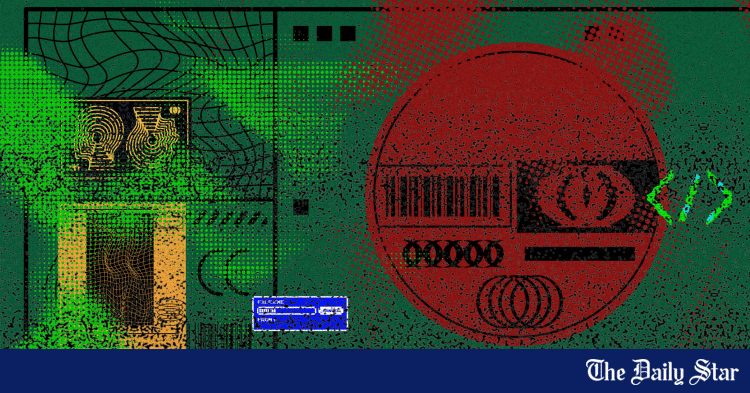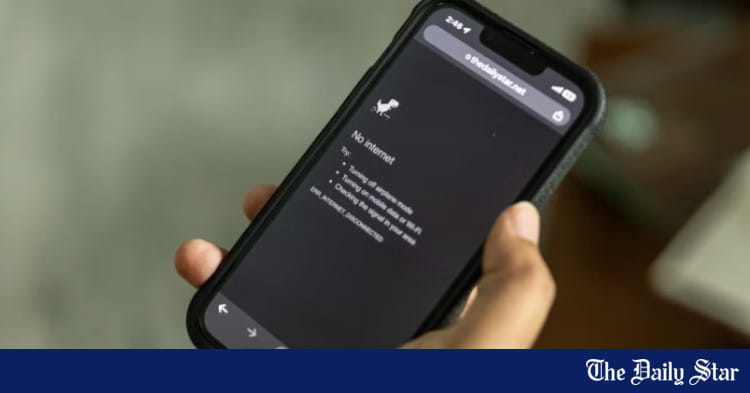Saif
Senior Member
- Joined
- Jan 24, 2024
- Messages
- 15,424
- Nation

- Axis Group


Bangladesh enters the era of high-speed internet
The official launching of the much-anticipated commercial operation of Starlink, as reported, will evidently contribute to creating a competitive market for the internet service providers in Bangladesh. It is for the first time that the Bangladesh Telecommunication Regulatory Commission
Bangladesh enters the era of high-speed internet
Published :
May 24, 2025 00:27
Updated :
May 24, 2025 00:27

The official launching of the much-anticipated commercial operation of Starlink, as reported, will evidently contribute to creating a competitive market for the internet service providers in Bangladesh. It is for the first time that the Bangladesh Telecommunication Regulatory Commission (BTRC) has issued licence to a Non-Geostationary Orbit (NGSO) satellite internet service for its operation in the country. Starlink's NGSO satellites' signals reach the Earth faster and can provide a broader range of radio frequencies allowing for increased bandwidth and better data transfer speed. This internet service reportedly promises to offer unlimited data with speeds up to 300 Mbps (Megabits per second), a unit to measure the speed of data transfer. Compared to the existing broadband services in operation in Bangladesh, Starlink's would be, according to reports, more expensive with a one-time residential installation fee of Tk47,000 and a monthly subscription of Tk6,000 and Tk 4,200. So, considering the income level of common internet users in Bangladesh like students, researchers and freelancers, the service would hardly be affordable for them.
The question arises because Starlink's service is reportedly more suitable for users living in the countryside, remotely-placed areas including rugged terrains where the existing optical fibre infrastructure for broadband services has not reached. This undoubtedly gives this (Starlink) internet service a big advantage over those currently available in the urban areas. But in that case, considering the higher fees of Starlink service, its potential users in the underserved areas would obviously be at a disadvantage. The government would be required to take the cost issue into consideration while extending this high-speed, low-latency internet service to the country's remote areas. The government's financial support as well as arrangement for cheap credit from banks or financial services would be of help for students, self-earning women in online business and others operating in the countryside.
The government is reportedly also working to create a financial package to make Starlink available to those who would provide citizen service. To this end, the government is also learnt to have been planning to facilitate financing through microcredit authorities, financial organisations and banks. So far so good. Hopefully, Starlink's operation would not disrupt, but rather create a well-balanced ecosystem with the broadband infrastructures of the local internet service providers.
On the issue of data sovereignty, the special assistant to the Chief Adviser for the Ministry of Posts, Telecommunications and Information Technology, Faiz Ahmad Taiyeb, is learnt to have assured that all Starlink data traffic would be routed through local gateways (Internet Service Providers, ISPs) in compliance with the national regulations. That is only expected of a tech company, foreign or local, willing to invest and operate in the country and, especially when as important an issue as all the sensitive data of the nation is involved. In this case, more important is the people looking after the law than the abstract law itself. One might recall at this point how National Identity Card information was leaked to third parties from the Election Commission (EC)'s database. Given that the country does not have so enviable a record on data protection, it is important to ensure that sensitive data of the nation are always in safe hands. This is more so when a number of international tech giants are learnt to have expressed their interest to operate in Bangladesh.
Published :
May 24, 2025 00:27
Updated :
May 24, 2025 00:27
The official launching of the much-anticipated commercial operation of Starlink, as reported, will evidently contribute to creating a competitive market for the internet service providers in Bangladesh. It is for the first time that the Bangladesh Telecommunication Regulatory Commission (BTRC) has issued licence to a Non-Geostationary Orbit (NGSO) satellite internet service for its operation in the country. Starlink's NGSO satellites' signals reach the Earth faster and can provide a broader range of radio frequencies allowing for increased bandwidth and better data transfer speed. This internet service reportedly promises to offer unlimited data with speeds up to 300 Mbps (Megabits per second), a unit to measure the speed of data transfer. Compared to the existing broadband services in operation in Bangladesh, Starlink's would be, according to reports, more expensive with a one-time residential installation fee of Tk47,000 and a monthly subscription of Tk6,000 and Tk 4,200. So, considering the income level of common internet users in Bangladesh like students, researchers and freelancers, the service would hardly be affordable for them.
The question arises because Starlink's service is reportedly more suitable for users living in the countryside, remotely-placed areas including rugged terrains where the existing optical fibre infrastructure for broadband services has not reached. This undoubtedly gives this (Starlink) internet service a big advantage over those currently available in the urban areas. But in that case, considering the higher fees of Starlink service, its potential users in the underserved areas would obviously be at a disadvantage. The government would be required to take the cost issue into consideration while extending this high-speed, low-latency internet service to the country's remote areas. The government's financial support as well as arrangement for cheap credit from banks or financial services would be of help for students, self-earning women in online business and others operating in the countryside.
The government is reportedly also working to create a financial package to make Starlink available to those who would provide citizen service. To this end, the government is also learnt to have been planning to facilitate financing through microcredit authorities, financial organisations and banks. So far so good. Hopefully, Starlink's operation would not disrupt, but rather create a well-balanced ecosystem with the broadband infrastructures of the local internet service providers.
On the issue of data sovereignty, the special assistant to the Chief Adviser for the Ministry of Posts, Telecommunications and Information Technology, Faiz Ahmad Taiyeb, is learnt to have assured that all Starlink data traffic would be routed through local gateways (Internet Service Providers, ISPs) in compliance with the national regulations. That is only expected of a tech company, foreign or local, willing to invest and operate in the country and, especially when as important an issue as all the sensitive data of the nation is involved. In this case, more important is the people looking after the law than the abstract law itself. One might recall at this point how National Identity Card information was leaked to third parties from the Election Commission (EC)'s database. Given that the country does not have so enviable a record on data protection, it is important to ensure that sensitive data of the nation are always in safe hands. This is more so when a number of international tech giants are learnt to have expressed their interest to operate in Bangladesh.











































